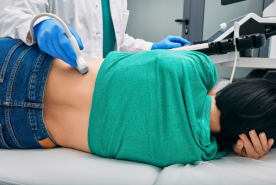July 05, 2022
Take a stroll down any aisle at a grocery or convenience store, and you'll find a wide variety of quick and easy-to-make ultra-processed foods and drinks. They're tasty, and you can dig into them immediately or eat them after a few minutes in the microwave or on the stove.
Seems too good to be true, right? A newly published study says that it most likely is.
The link between ultra-processed foods and kidney disease
The study followed more than 14,000 adults without kidney disease over 24 years to see whether or not ultra-processed foods (UPFs) increased the risk of developing kidney disease.
The results may shock you.
Those who consumed high rates of UPFs had a 24% higher chance of developing kidney disease: Almost 5000 people in the group who consumed a diet high in UPFs developed chronic kidney disease.
"It is increasingly apparent that food is medicine: the right diet can prevent kidney disease, but some foods, especially in large quantities, may actually cause kidney disease," said NKF Chief Scientific Officer Kerry Willis, Ph.D. "In this study, there was a direct correlation between the amount of UPF consumed and CKD risk. That should be concerning to everyone—physicians, patients, parents, and public health officials."
What are ultra-processed foods?
They are heavily processed foods full of artificial additives, added sugar, refined carbohydrates, saturated and trans fats, and sodium. They don't contain high amounts of fiber, protein, or micronutrients. Additionally, the food may be contaminated by the packaging or packaging process.
Examples of ultra-processed foods include:
- carbonated soft drinks or soda
- sweet, fatty, or salty packaged snacks
- candies, cookies, and cakes
- mass-produced packaged bread
- margarine
- cereals
- instant soups and noodles
- processed meat and cheese
Of all the UPFs studied, sugar-sweetened beverages and ultra-processed meats were the top culprits, increasing the risk of developing kidney disease by 22% and 18%.
How to avoid UPFs
How do we avoid ultra-processed foods in a world that bombards us with advertisements and tempts us at every corner?
The study showed that substituting even one serving of ultra-processed foods per day with minimally processed food lowers the risk of developing kidney disease by 6%. Start by switching out one or two USFs a day with water, fruits, vegetables, nuts, or whole grains.
Here are a few ideas from the Food and Agriculture Organization of the United Nations' food classification system to inspire your swaps.
| I’m craving… | Try |
| Soda | Fresh fruit in water, kombucha |
| Sweets like candy, cookies, or cakes | Fresh or frozen fruit and berries, homemade chia seed pudding |
| Salty packaged snacks like chips | Raw vegetables, homemade sweet potato chips |
| Sweet and salty | Homemade trail mix with low or no-sodium nuts and dried fruit |
| Mass-produced packaged bread | A slice of homemade or bakery-fresh whole wheat bread |
| Cereals | Overnight steel-cut oats, rolled oats |
| Processed meat | Home-cooked carved chicken or turkey breast, boiled eggs |
Remember, these swaps may be better, but moderation and a varied diet are still key to a healthy life. If you have dietary needs or restrictions, a registered kidney dietitian can help create a plan that's right for you.
Cost-saving ideas to help you ditch the processed foods
You may have to get creative to rid your pantry of processed foods. We're here to help. Here are five budget-friendly ways to increase whole foods in your diet without breaking the bank.
- Go to or create a community garden: If you don't have the space to start a garden, look for the nearest community garden. Here, you'll have the opportunity to make new friends as you grow your own food. If there isn't one nearby, you can make a difference in your community by starting your own. Here's how.
- Switch up your pantry staples: Bags of dried lentils, beans, and brown rice often provide more food and are less expensive than prepared ones because they take longer to cook. Stock up on these items and prepare them as the package says. Some may need to be soaked overnight, but the extra time is worth it! Plus, you can control how much salt goes into the dish so you can eat less sodium.
- Create a food scrap garden: Instead of throwing away leftover fruit and vegetable scraps, use them to grow an entirely new plant! The options are endless- you can regrow fruit from seeds or vegetables from cuttings. Not sure where to start? Here are some kidney-friendly fruits and vegetables you can grow indoors.
- Check out farmer's markets: Farmer's markets are festive spaces where you can enjoy yourself while purchasing fresh, affordable produce. Since these markets are so lively, friends, family, or neighbors may want to come along. Take advantage of that by organizing trips and carpooling to help save on gas.
- Go frozen: Fruits and vegetables are frozen at the peak of their freshness to help maintain the nutrients. They last longer and are less expensive than their fresh counterparts. Look for frozen fruit and vegetables but watch out for added sauces or mixes that may contain UPFs.









